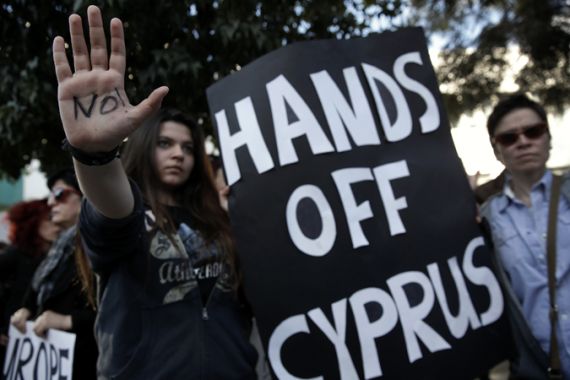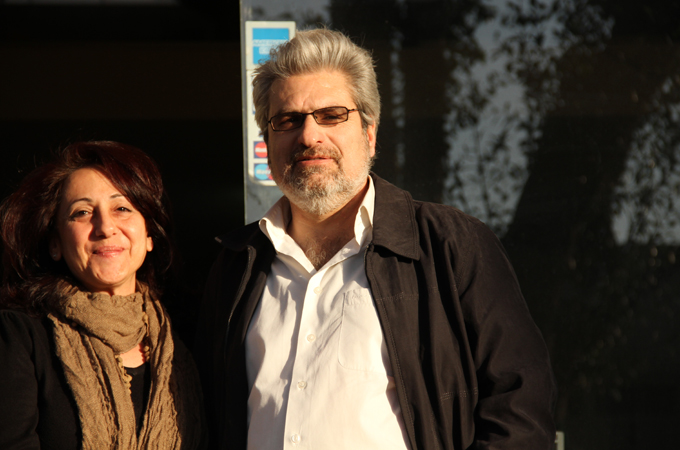One Cypriot family’s economic nightmare
As Cyprus braces for debt-crisis fallout, a stricken family waits uneasily to see how the tumultuous situation unfolds.

Nicosia, Cyprus – The streets are almost deserted in the Cypriot capital with residents choosing to either enjoy the Christian Orthodox holiday, or absorb themselves in the country’s unfolding economic and political crisis.
One of those choosing to stay home and follow the disconcerting events on television is 50-year-old mother of five, Sofia Poli. Her two dogs, Luna and Romona, bound through the second-story four bedroom apartment to greet guests entering the door.
When she is not checking the latest updates on the television, Poli sits at a small table with the morning sunshine coming through her kitchen window, smoking cigarettes and drinking coffee.
“I’m not an economist but I have to try to know what’s going on and what’s going to happen,” she says.
Like many Cypriots trying to rationalise the country’s current travails, Poli draws parallels with the country’s last great existential juncture – the 1974 war with Turkey and Cyprus’ subsequent partition.
“It was the politicians’ fault in ’74, so it must be their fault again,” she says, taking a puff on her cigarette. “We Cypriots are strong people. We survived the invasion of the Turks and the crisis that followed, but these are hard days also.”
|
“They’re threatening us, they’re pushing us. They threaten to close our banks and want us on our knees in front of Europe. If this goes through, I don’t believe it will stop here.“ – Sofia Poli, 50, struggling mother |
Billion euro ‘haircut’
Poli and her family have sat glued to the TV trying to understand how the tumultuous situation will affect their personal finances, and the national economy.
On Tuesday, the Cypriot parliament rejected a bailout plan that involved a tax on country’s private bank account holders.
Under the terms of the fiscal “haircut” that lawmakers rejected, all bank accounts holding less than 100,000 (US$130,000) euros would be taxed 6.7 percent, and those with more than 100,000 euros 9.9 percent.
The “haircut” was a condition of a proposed European Union and International Monetary Fund bailout package.
In light of Tuesday’s vote, Cyprus’ parliament will now have to come up with an alternative way to raise the 5.8bn euros ($7.5bn). If it does not, the country’s banks face collapse and Cyprus could go bankrupt.
Many Cypriots saw the bank account tax proposal as a betrayal of the promise of solidarity offered by membership in the European Union.
“They’re threatening us, they’re pushing us.” Poli contends. “They threaten to close our banks and want us on our knees in front of Europe.”
Poli blames the government’s naivety for joining hands with the European Union in the first place.
“The new government seemed so strong when it went to Europe, but now we know they were just dreaming,” she says, shaking her head. “They thought the Germans were our friends, but in the end they knew nothing.”
 |
| Andonis and Sofia Kividiotou are worried about the future as Cyprus faces bankrupcy [Nigel O’Connor/Al Jazeera] |
Caught sleeping
The sharp shocks of recent times are showing Poli that it is not just her government that was taking things for granted.
“I thought I was safe but I don’t feel safe now,” she says. “It’s like they gave us something to sleep and we just sit here watching. People need to react.”
For Poli, the economic crisis, lasting since 2008, has already deteriorated her family’s finances to the point that new austerity measures likely would have little effect.
“We have only loans, so they can have them,” she laughs. “We don’t have personal money in the bank, and we live day-by-day. That electricity bill on the fridge has been watching me for a couple of weeks, and I’ve been watching it, but it doesn’t go away.”
Before the financial crisis, Poli and her husband took out an 84,000 euro ($109,000) loan to buy a house in their home village, Lefkara. In January, a telephone caller asked Poli to visit her bank.
“They told us we were behind on the repayments and could lose the house,” Poli says.
Until the introduction of austerity measures last year, Cypriot families with more than four children received a government grant. That was scrapped, however.
“It was only 55 euros per month but we used it to pay the mortgage,” Poli says. “Now that we’ve lost it we’re struggling to manage. Maybe we will have to stop renting and leave the city, move back to the village, but there are no jobs there for us there.”
Long dried up
Andonis, Sofia’s husband, rents a small workshop where he fixes computers. Before 2008 he had a steady flow of business and regular corporate clients providing him with maintenance schedules. This has all long dried up. Now, on a good day, he might format two hard drives for a profit of between 60-100 euros ($80-$130).
 |
| Cypriot President Nicos Anastasiades on Monday [Reuters] |
“Business is less than half of what it used to be,” Sofia says. “He usually comes home at around 9pm. Some days he might be lucky to sell a mouse and make 20 euros [$26].”
Customers often delay paying their bills because of their own financial difficulties. “We don’t blame the people,” Poli says. “Cyprus is a small place and we know them. Some days, though, we don’t have money.”
Poli works as a personal assistant to the general manager of a pharmaceutical company. She says she divides her monthly salary between her children. Mostly it supports her 27-year-old son – in order to limit the amount he must borrow from banks to finish his university studies.
Her daughter and eldest child Maria, studied psychology but could not afford to continue to postgraduate studies, and now works in retail selling clothes.
“She had so many dreams but they had to stop,” Poli says, lighting another cigarette. “She doesn’t want to sit at home on the couch wishing she were a psychologist though. She is glad she has a job.”
Army food
Compulsory military service for men in Cyprus is a burden borne by the country’s population since the 1974 war. Poli has two sons currently serving in the army. They receive 150 euros ($195) per month for the duration of their two-year term of service. She says they are not eating well.
“I take their dinner to the barracks every night,” Poli says worriedly. “The food in the army is not good.”
One of her sons, Michaelis, is set to finish his service in July and says he fears the economic reality he is about to enter.
|
“It’s horrible what is happening, just horrible. The politicians and the European Union have sold us out.“ – Michaelis Poli, Cypriot soldier |
“It’s going to be very difficult to go out and find a job,” Michaelis Poli says. “To be honest I really don’t see any future in this country. I’ve given two years of my life to the army. I have delayed study and delayed getting work, but I don’t think I will get much back.”
Michaelis says the financial plan of the government is a betrayal of the Cypriot people.
“It’s horrible what is happening, just horrible,” he says. “The politicians and the European Union have sold us out.”
The best outcome he can see for himself is to leave Cyprus after completing his studies and move abroad in search of a decent living.
“Maybe I could go to Australia. I worry about my parents and will need to be working in case they need help,” he says.
Despite the hardships of recent times, Michaelis’ mother sees some positives in the way she and the people see their lives nowadays.
“People had faith in money,” Poli says of the pre-crisis era, when Cyprus was a new member of the euro zone. “It came so suddenly and we lost the meaning of being human beings. It’s good to have a smack in the face like this, and to realise the meaning of real life.”